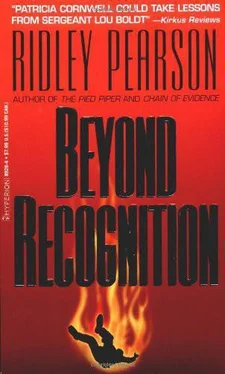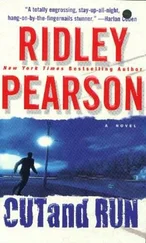Ridley Pearson - Beyond Recognition
Здесь есть возможность читать онлайн «Ridley Pearson - Beyond Recognition» весь текст электронной книги совершенно бесплатно (целиком полную версию без сокращений). В некоторых случаях можно слушать аудио, скачать через торрент в формате fb2 и присутствует краткое содержание. Жанр: Триллер, на английском языке. Описание произведения, (предисловие) а так же отзывы посетителей доступны на портале библиотеки ЛибКат.
- Название:Beyond Recognition
- Автор:
- Жанр:
- Год:неизвестен
- ISBN:нет данных
- Рейтинг книги:5 / 5. Голосов: 1
-
Избранное:Добавить в избранное
- Отзывы:
-
Ваша оценка:
- 100
- 1
- 2
- 3
- 4
- 5
Beyond Recognition: краткое содержание, описание и аннотация
Предлагаем к чтению аннотацию, описание, краткое содержание или предисловие (зависит от того, что написал сам автор книги «Beyond Recognition»). Если вы не нашли необходимую информацию о книге — напишите в комментариях, мы постараемся отыскать её.
Beyond Recognition — читать онлайн бесплатно полную книгу (весь текст) целиком
Ниже представлен текст книги, разбитый по страницам. Система сохранения места последней прочитанной страницы, позволяет с удобством читать онлайн бесплатно книгу «Beyond Recognition», без необходимости каждый раз заново искать на чём Вы остановились. Поставьте закладку, и сможете в любой момент перейти на страницу, на которой закончили чтение.
Интервал:
Закладка:
The artist worked furiously. On the page the shape of a body formed between two of the cars. Ben instructed the man, “He was standing back farther … was a little taller than that.” He couldn’t believe how clear it was in his mind. Seeing the artist’s sketch made it all so real for him-he knew exactly what was wrong with the picture. “There was a column there, you know? Yeah … like that. He was kinda leaning against it…. Yeah! There! That’s cool. Real cool.” He waited for the artist to get more of the guy on the page, then said, “His head was … I don’t know … thinner, you know?”
“Narrower?” Boldt asked.
“Yeah. Narrow. He had glasses. Big glasses, I think.” The artist corrected the head to where it was just right. He added the glasses three times until Ben said he had it. “A hat. One of those stretchy ones.”
“A knit cap,” Boldt said.
“Yeah. And a turtleneck up over his chin, I think. Or maybe a scarf or like the guys in the Westerns.”
“A bandanna,” Daphne said.
It amazed Ben how quickly the artist adjusted to every comment, how quickly it went down on the page. His hands moved in a flurry of activity, and when he pulled them away, it seemed like a Polaroid developing, the image growing out of nothing.
“Jeans?” Boldt asked.
“I couldn’t see his legs much,” Ben answered, more interested in the artist than Boldt. “No, not like that. Not a turtleneck, I guess.” The man erased it and tried a bandanna. “No. I don’t think so.” A moment later the man’s head changed completely. “Oh, wow! That’s it. That’s him.” The artist had drawn a hooded sweatshirt onto the man, the strings pulled tightly under his chin so that, when combined with the glasses, almost nothing showed of his face. “That’s it!” Ben repeated.
“The hood up like that?” Boldt asked.
“Just like that,” Ben answered.
“Any markings on the clothes?” Boldt questioned. “A sports team? A company logo? The name of a city or town?”
“You can shut your eyes if it helps,” Daphne said.
Ben tried shutting his eyes, and the image that was frozen while on the artist’s page suddenly came to life. He could smell the car exhaust, hear the airplanes and car traffic; the guy moved his head back and forth, first looking toward the truck where Ben hid, then toward the elevator and Nick with that duffel bag. Light sparked off his mouth. Ben decided to mention this. “His teeth are shiny.”
“Braces?” Boldt asked.
“I don’t know,” Ben said, his eyes still squinted shut. “Can’t see. Not exactly.”
“A gold tooth? A silver tooth?” Daphne asked.
“I don’t know,” Ben answered honestly. “Can’t see much.”
“What’s the man doing?” Boldt asked.
Ben described the scene for them, the guy in the shadows checking out Nick and the truck. “He’s careful, you know? He’s waiting for Nick to get on the elevator. And then he does-Nick does-and the guy is coming for me, right at me!” He talked them through his panic as the guy headed toward the truck, the sense of panic, of diving back under the seat, of the truck never moving under the weight of the man, and then hearing that lock click into place. His terror at being locked up for a second time.
“As he walked toward the truck,” Daphne said calmly, “he came closer to you, didn’t he, Ben?” She added, “Maybe he stepped out of the shadows a little. Into the light a little. Go ahead and shut your eyes and try to picture that for me, would you? Can you remember? Can you see it?” Her voice was soothing, the same voice that had comforted him in the car, and so he closed his eyes, just as she said to do, and sure enough, the dark sinister form stepped out of the shadows, and for an instant Ben thought he could see part of the man’s face. What made the experience especially strange for him was that he didn’t remember this at all. Instead, it felt as if Daphne had made him see something he had never seen.
“I don’t know….” he mumbled.
“Go ahead,” she encouraged.
“I’m not sure.”
“It’s all right, Ben. You’re safe here. It didn’t feel safe then, did it?”
“No way.”
“You were scared. He was coming toward you.”
“I can’t get out,” he told her. “The door is unlocked and I don’t dare go out there.”
“He’s coming toward you.”
“Yeah.”
“But there’s more light.”
“Headlights. A car’s headlights,” he said, for he could see the image inside his head: it was in black-and-white, not color, and it happened quickly, and no matter how hard he tried, he couldn’t slow it down. “He’s wearing a mask, I think. Plastic. A white plastic mask. Shiny, you know? Like a hockey goalie, maybe.”
“He wore a disguise,” Boldt said in a voice of disappointment. “Damn.”
The artist said, “A mask inside the pulled-up hood. Glasses over the mask. Hell of a disguise.”
The artist held up the sketch for him. It was just the guy’s head and shoulders, the parking garage a blur behind him. He had the sweatshirt up over most of his face, wore big dark glasses and had plastic-looking skin. The hat topped off the image. It was creepy to Ben how close that drawing came to real life.
“That’s him,” Ben whispered. He didn’t want to talk too loudly. The picture seemed real enough that the guy might hear.
43
Boldt thought of himself less as a public enforcer, more as a paid puzzle solver. Forensic evidence, testimony of witnesses, medical examiner reports, unforeseen events-all added up to a giant puzzle that the lead detective was supposed to solve. In the case of an ongoing serial homicide investigation, failure to solve the puzzle resulted in more deaths, the loss of innocent lives. It proved to be potent motivation. It robbed one of a private life, deprived one of sleep, gnawed at one’s self-confidence. Boldt disliked himself and felt himself a failure-he couldn’t even blame Liz for her affair, if it was real; he’d been consumed with work for months.
When he reached his hotel after questioning Ben and the clerk handed him a brown paper bag-and it wasn’t his laundry coming back-the sergeant experienced a pang of dread. His first thought was that it was a bomb. He carried it to his room carefully and spent five long minutes inspecting it. Perspiration breaking out on his brow, he dared to uncurl the top of the bag slowly and open it equally slowly. Inside was a note from LaMoia and a half dozen items purchased from a hardware store-items purchased by Melissa Heifitz on the same day as her fire.
Boldt clicked the TV on to CNN and went about examining the contents of the bag: a compressed air canister called E-Z Flush, rubber gloves, a sponge head to a mop.
The items from Enwright were in the dresser’s bottom drawer. He took these out and compared. Common to both groups were sponges and gloves. A bottle of Drano in the Enwright group, E-Z Flush in the other; a bottle of compressed gas to be used as a plunger to clear the stubborn drain. Boldt spun the device around in his hands. On the can’s back panel was a simple illustration of a sink and another of a bathtub. In his mind’s eye he recalled his own bathtub having trouble draining, and a moment later he placed it as on the night of his family’s evacuation.
Clogged drains! he realized. A common link between Enwright, Heifitz, and even himself!
He called Bernie Lofgrin at home. The lab man answered cheerfully. Boldt did not introduce himself, for Lofgrin knew his voice. He said, “What are the chances that the hypergolics, that the ignition system, is somehow related to plumbing, to the house plumbing? To clogged drains?”
After a long silence, Lofgrin said, “I’m thinking.” He mumbled, “Plumbing?” But Boldt did not interrupt. “Clogged drains?”
Читать дальшеИнтервал:
Закладка:
Похожие книги на «Beyond Recognition»
Представляем Вашему вниманию похожие книги на «Beyond Recognition» списком для выбора. Мы отобрали схожую по названию и смыслу литературу в надежде предоставить читателям больше вариантов отыскать новые, интересные, ещё непрочитанные произведения.
Обсуждение, отзывы о книге «Beyond Recognition» и просто собственные мнения читателей. Оставьте ваши комментарии, напишите, что Вы думаете о произведении, его смысле или главных героях. Укажите что конкретно понравилось, а что нет, и почему Вы так считаете.












